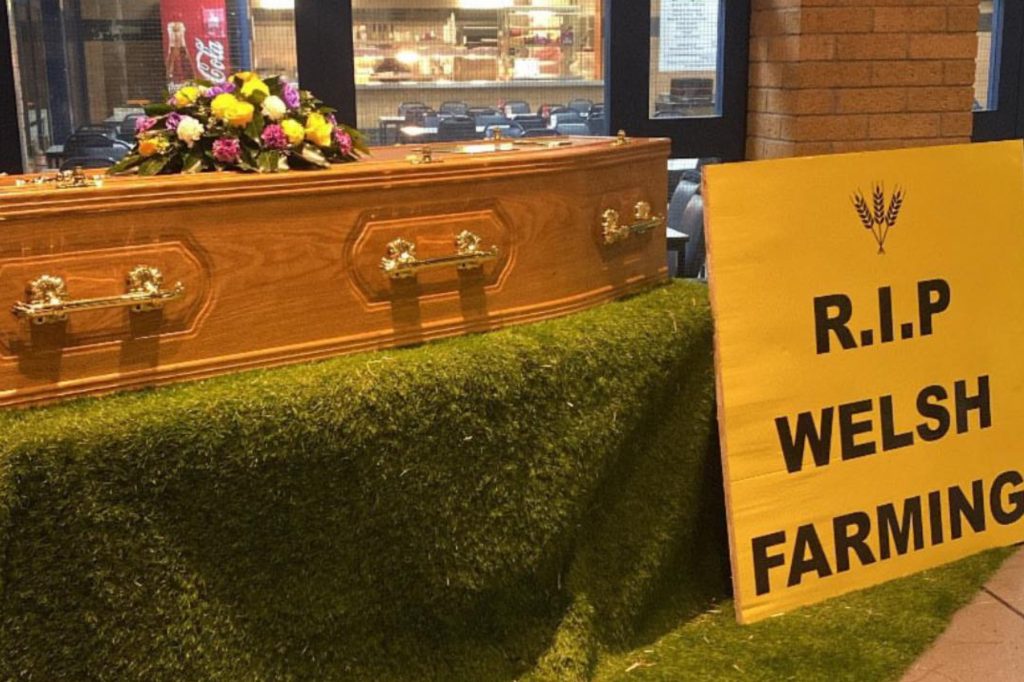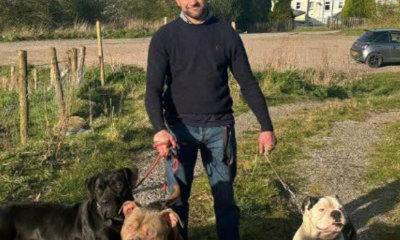Farming
Huge turnout in Carmarthen as Welsh farmers protest government reforms

APPROXIMATELY 3,000 Welsh farmers and their supporters converged at the Carmarthen showground in Nantyci this week (Feb 8), voicing their stern opposition against the planned reforms by the Welsh Government.
This significant gathering followed a similarly packed meeting in Welshpool last week, which saw over 1,000 attendees.
The protests have been ignited by the Welsh Government’s proposed changes to farming policies, aimed at encouraging “sustainable” agricultural practices. Under the new subsidy scheme, set to be implemented from 2025, farms would need to dedicate 10% of their land to tree planting and another 10% to wildlife habitats to qualify for payments. These measures are part of a broader effort to combat climate change and biodiversity loss.

However, the reforms have been met with widespread criticism from the farming community.
A mock coffin, bearing the inscription “In memory of Welsh farming,” was paraded by protestors at the demonstration, symbolising the perceived threat to the industry. Signs with messages like “RIP Welsh farming” and “no farmers, no food” were also prominently displayed, underscoring the deep concerns within the agricultural sector.
The Welsh Government has urged farmers to engage in the ongoing consultation process regarding the reforms, suggesting that changes to the plans could still be made. Despite this, the sentiment on the ground reflects a profound fear of the future, with many farmers feeling the new requirements would impose unmanageable burdens and significantly increase administrative work.
The farming industry’s leaders have not minced words, describing the current moment as a “crunch point” for Welsh agriculture. They argue that the scheme’s rigid requirements on tree and habitat creation, coupled with the lack of clear details on payment rates, will have disastrous effects on farm businesses. An impact assessment accompanying the consultation predicted a substantial reduction in livestock numbers and a potential loss of 5,500 jobs, further exacerbating the industry’s anxieties.
In response to the mounting pressure, the Welsh Government, represented by Rural Affairs Minister Lesley Griffiths, has acknowledged the sector’s concerns, emphasising the importance of the consultation process and suggesting that adjustments to the proposals are likely. The government insists that the Sustainable Farming Scheme (SFS) aims to ensure the long-term viability of Welsh farming, alongside environmental sustainability.
Nevertheless, the farming community remains skeptical. The current and final consultation period represents a critical juncture for Welsh farmers to express their concerns and potentially influence the future direction of agricultural policy in Wales. With a history of farming that runs deep in the Welsh countryside, the outcome of this dispute will undoubtedly have far-reaching implications for the region’s rural economy and way of life.
Samuel Kurtz MS, said on X: “Immensely proud and in awe of every farmer at Carmarthen Mart tonight. The sleeping dragon that is rural Wales is awakening after years of neglect by Labour.
“Fed up, frustrated but not taking a backward step.”
The Welsh Conservatives say that the Labour Government does not listen to Welsh farmers. “The farming community is understandably frustrated at being ignored for so long”, they said on social media.
WELSH FARMERS AT A CROSS ROADS
With just a month remaining in the final consultation period for the Sustainable Farming Scheme (SFS), agricultural leaders in Wales have sounded the alarm, declaring the sector at a critical juncture. The scheme, which has been under development following the Welsh Government’s commitment to sustainable agriculture, faces mounting scrutiny from the farming community. Concerns hinge on the government’s insistence on a 10% land allocation for both tree planting and habitat creation, with many in the sector calling for a reconsideration of these requirements amid fears of significant operational and financial impacts.
The Farmers’ Union of Wales (FUW) has been at the forefront of opposition, highlighting the scheme’s potential to cause a near 10.8% reduction in livestock numbers and an 11% decrease in agricultural labor, equating to an estimated £199 million loss in farm business income. FUW President Ian Rickman emphasised the urgency of the situation, urging all stakeholders to engage in the consultation process to advocate for necessary adjustments to the scheme.
Amidst this backdrop of concern, individual farmers like Tudur Parry, a dairy, beef, and sheep farmer from Caernarfon, express apprehension towards the SFS’s rigidity, particularly around land use for trees and habitats. Parry’s concerns reflect a broader sentiment that the scheme’s current form could undermine the viability of traditional farming operations in Wales.
The consultation process has also shed light on the anxiety permeating the farming community, with only a fraction of attendees at a recent FUW meeting indicating their willingness to participate in the SFS under its present conditions. This reluctance underscores the perceived incompatibility of the scheme with
Community
Celebrating nature recovery through Cysylltu Natur 25×25

A CELEBRATION event was held on Saturday, January 24 in Cwm Gwaun to mark the achievements of Pembrokeshire Coast National Park Authority’s Cysylltu Natur 25×25 project, bringing together volunteers, farmers and staff involved in delivering nature restoration across North Pembrokeshire.
The landscape-scale project was funded by the Welsh Government through the Nature Networks Programme, delivered by the Heritage Fund. The Programme aims to strengthen ecological connectivity and resilience by restoring habitats at scale.
Those attending the event heard about the wide range of conservation activity delivered through the project across the north of the National Park. This has included practical works to restore grazing to Rhos pasture to benefit marsh fritillary butterflies and southern damselflies, specialist work to conserve rare lichens, volunteer chough, dormouse and harvest mouse monitoring, safeguarding greater horseshoe bat hibernation sites, and targeted action to tackle invasive species threatening important sites.
Volunteers, farmers, land managers and contractors played a vital role in the success of the project, contributing local knowledge, practical skills and ongoing commitment to caring for Pembrokeshire’s unique landscapes and wildlife in the long term.
Mary Chadwick, Conservation Officer for Pembrokeshire Coast National Park Authority, said: “Cysylltu Natur 25×25 has shown what can be achieved when farmers, volunteers and conservation specialists work together with a shared aim.
“From monitoring some of our most elusive species to restoring and protecting habitats, the dedication of everyone involved has made a real difference for nature across the National Park.”
Although the Cysylltu Natur 25×25 project is now coming to an end, the important work it has supported will continue. Building on its successes, Pembrokeshire Coast National Park Authority will carry this momentum forward through the next phase of nature recovery work under NNF4 Cysylltiadau Naturiol / Naturally Connected, ensuring ongoing protection and enhancement of habitats for future generations.
Farming
Judicial review granted for hundreds of farmers and landowners in Wales

OVER three hundred Welsh farmers and landowners have been granted the right to legally challenge Green GEN Cymru’s ‘unlawful behaviour’ at the High Court.
The collective filed a judicial review application on behalf of the community groups, Justice for Wales and CPRW, on four separate grounds, including claims that the energy company has acted unlawfully and with disregard for biosecurity and the environment, while trying to gain access to private land to conduct surveys for three major overhead pylon routes.
The proposal will see the energy infrastructure and pylons spanning 200 km across Powys, Ceredigion, Carmarthen, and Montgomeryshire in Wales and across the Welsh border into Shropshire, in the West Midlands of England.

Mrs Justice Jefford granted permission on four grounds – including abuse of power and procedural impropriety – during the three-and-a-half-hour hearing at Cardiff Civil Justice Centre on Tuesday, January 20.
A two-day hearing is expected to take place in April 2026, date to be confirmed.
The judge also accepted an undertaking from Green GEN Cymru that it would not enter land using s.172 powers – the right given to acquiring authorities to enter land to conduct surveys or valuations under the Housing and Planning Act 2016 – until an urgent interim relief application hearing can be held.
Natalie Barstow, founder of Justice for Wales, said: “This is a moment of vindication. For months, we have been left feeling unsafe in our own homes and stripped of our power as farmers and landowners.
“This is not a protest against renewable energy; this is about standing up for what is right. Our right to dignity and to have a voice, and for the future of our land, wildlife, and livelihoods.
“Since we began this battle, hundreds of other farmers and landowners across Wales have come forward with similar stories, and we’ve been supported by many generous donations to fund the legal challenge. We knew we weren’t alone in our concerns, but the response demonstrates it is a far wider issue than we initially feared, and why it is so important that Green GEN’s conduct and protocols are properly scrutinised.
“We said we will not be bullied into submission, and this judgment is just the first foot forward in our fight for justice.”
Mary Smith, a lawyer at New South Law, the law firm representing the impacted communities, said: “Holding acquiring authority status does not entitle a company to disregard the limits of its statutory powers or the rights of the people affected.
“The Court’s decision confirms that Green GEN Cymru must be held to the same legal standards as any other public body when exercising intrusive powers over private land. This case is about restoring fairness, accountability, and respect for the communities whose livelihoods and environments are at stake.”
Farming
New rules to make Welsh lamb pricing clearer set to begin next week

Mandatory carcass grading and price reporting will be required in slaughterhouses from Wednesday, January 28
WELSH sheep farmers are set to see new rules introduced next week aimed at making the lamb market fairer and more transparent.
From Wednesday (Jan 28), slaughterhouses in Wales will be required to classify sheep carcasses and report prices using a standardised system. The Welsh Government says the move will improve consistency in grading, make price information easier to compare, and help build confidence for farmers selling stock.

Deputy First Minister Huw Irranca-Davies announced the change during the Farmers’ Union of Wales (FUW) Farmhouse Breakfast event at the Norwegian Church in Cardiff.
He said the measures would support the industry by ensuring a consistent methodology for classifying carcasses in slaughterhouses, promoting transparency, fairness and productivity within the sheep market.
“Our iconic Welsh lamb is celebrated around the world for its outstanding quality and high production standards,” he said. “These measures will implement a consistent methodology for classifying sheep carcasses in slaughterhouses, promoting transparency, fairness, and increased productivity within the sheep market.”
The regulations bring the sheep sector into line with rules already used for beef and pork.
Hybu Cig Cymru – Meat Promotion Wales chief executive José Peralta said the changes would allow for greater data capture and analysis and improve transparency within the supply chain.
He said: “The new regulations, which now align with a similar position for cattle and pigs, will allow for greater data capture and analysis to be undertaken and support increased transparency within the sector. As a sector we must seek all opportunities for greater transparency within the supply chain to ensure that choices can be made from an informed position.”
The Welsh Government says the new approach is part of a wider UK framework, with similar arrangements already operating elsewhere.
During his address, the Deputy First Minister also pointed to further changes expected in 2026, including the planned introduction of the Sustainable Farming Scheme, which the Welsh Government describes as a new partnership between the people of Wales and farmers.
The scheme is intended to support the sustainable production of food while also responding to the climate and nature emergency.
The Welsh Government has also confirmed its commitment to financial support during the transition, with up to £238 million committed to the Universal layer and the legacy Basic Payment Scheme in 2026.
Deputy First Minister Huw Irranca-Davies said: “I would like to reiterate the Welsh Government’s commitment to supporting Welsh family farms, not just in the short term but also in the long run. Our goal is to prioritise stability for the farming industry, ensuring to balance this with sustainability at its very core.”
He added that supporting farmers through the change would be a priority, with consistent advice and support offered across the sector.
Building fairness within the agricultural supply chain remains a key Welsh Government priority, which it says is also integral to food security.
-

 Crime2 days ago
Crime2 days agoSex offender jailed after living off grid in Pembrokeshire and refusing to register
-

 Health23 hours ago
Health23 hours agoHealth board targets rise in steroid and gym drug use across west Wales
-

 News3 days ago
News3 days agoPrincess of Wales visits historic Pembrokeshire woollen mill
-

 Health5 days ago
Health5 days agoDoctor struck off after sexual misconduct findings at Withybush Hospital
-

 Crime1 day ago
Crime1 day agoTeacher injured and teenager arrested for attempted murder at Milford Haven School
-

 Community7 days ago
Community7 days ago50s women threaten legal action over pension compensation refusal
-

 News5 days ago
News5 days agoHerald journalists to feature in true-crime documentary on local lockdown murder
-

 Education6 days ago
Education6 days agoIndustry insight helps marine cadets chart career course




































